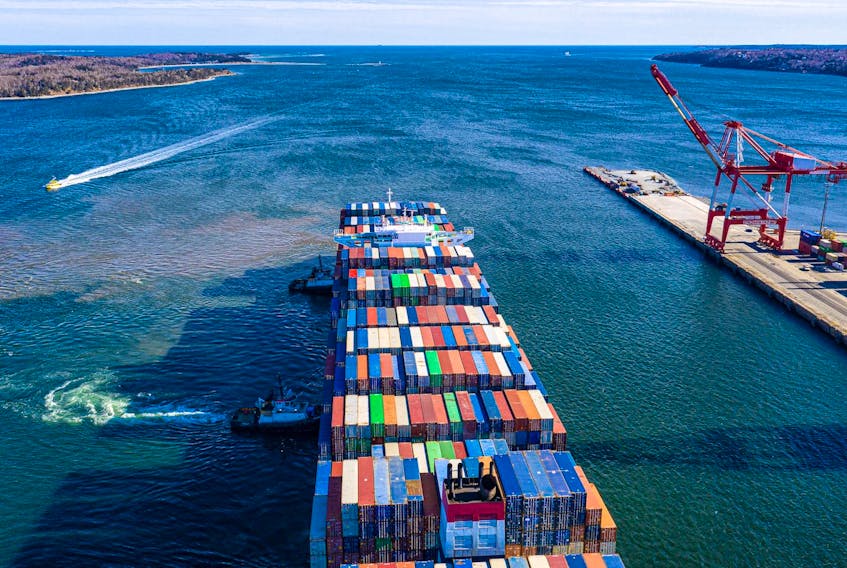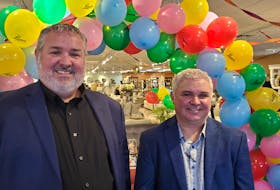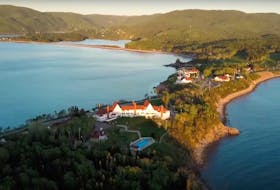Ideas born in Nova Scotia are the latest to get funding from Canada’s Ocean Supercluster.
In a virtual announcement Wednesday, March 24, on YouTube and Twitter, Supercluster CEO Kendra MacDonald said the three projects — collectively worth about $10 million — will get $4.7 million in funding from the federally-funded organization.
One of the projects involves development of technology to improve data in the marine shipping industry.
Related
- Tech firms from Newfoundland collect $3 million from Canada's Ocean Supercluster
- Petroleum Research NL building $18-million digital 3-D platform; Ocean Supercluster contributing $9 million
- Atlantic Canada aquaculture initiative valued at $27-million
Led by BlueNode, and with project partners Saab Technologies, the National Research Council and the Halifax Port Authority, the project team will develop new software to improve systems to track marine cargo shipments.
BlueNode CEO and co-founder Louis Beaubien, said in a press release, “The future of international trade is as much about data as it is about getting a product from one place to another; BlueNode plays the crucial role of making trade systems better through better data.”
Andrew Black, executive director of The PIER at the Halifax port, added, “Manifest information is notoriously poor in our industry. This project leverages newer technologies to address a significant and persistent industry problem. Better data enables better decisions and is core to creating a port resilience and agility.”
The OSC is contributing $1.1 million to the $3.2 million project.
Meanwhile, Mara Renewables Corporation is developing a fish oil product that doesn’t rely on fish.
Using marine microorganisms found in the Bay of Fundy, the company is working with Acadia University, Nature’s Way Canada and Algarithm Ingredients to discover newer sources of Omega 3.
According to Roberto Armenta, chief scientist with Mara Renewables, less than five percent of human consumption of Omega 3 nutrients is met by consumption of fish.
“Our project aims to develop a nutritional oil that mimics and complements the health benefits of fish oil consumption . . . producing a product that is sustainable and renewable,” he said during the announcement.
Today, alongside project partners, we announced three new projects with a total value of almost $10 million including the Fishless Marine Microbial Fish Oil Project.
— Canada’s Ocean Supercluster (@CanadaOSC) March 24, 2021
Learn more at: https://t.co/oODGrm7DmS @mara_corp @natureswaycan @AcadiaU @AlgarithmDHA @FP_Champagne @ISED_CA
According to a press release from the Ocean Supercluster, with the development of the fishless marine microbial oil, MARA will be one of a few companies in the world to offer a microbial source of Omega 3 in the form of a fish oil replacement.
The project is valued at about $3.5 million, and the OSC will provide $2 million.
The third project announced by the OSC on Wednesday was the autonomous Compact Passive Acoustic Sensing System (COMPASS).
This system will allow underwater acoustic data to be collected and analyzed in real-time from an untethered, autonomous underwater vehicle.
This project, touted as the first of its kind in Canada, will allow for faster, more reliable, collection of data from the ocean.
Today, alongside project partners, Canada's Ocean Supercluster announced three new projects with a total value of close...
Posted by Canada's Ocean Supercluster on Wednesday, March 24, 2021
Led by Sensor Technology, and partners Kraken Robotics and 3D Wave Design, the COMPASS product will be valuable to defence operations, oceanographic research, marine mammal protection and energy exploration.
David Shea, senior VP of engineering for Kraken Robotics, said the technology "will reduce the number of personnel required for offshore monitoring activities, to operate either from unmanned surface vessels, or fully automated underwater vehicles."
To produce acoustic arrays, SensorTech will invest in in skills development within its existing workforce in Dartmouth.
Both SensorTech and Kraken Robotics will see new hires resulting from this project.
To produce the arrays, new manufacturing facilities and equipment will be needed.
The project is valued at $3 million and the OSC is contributing $1.6 million.









